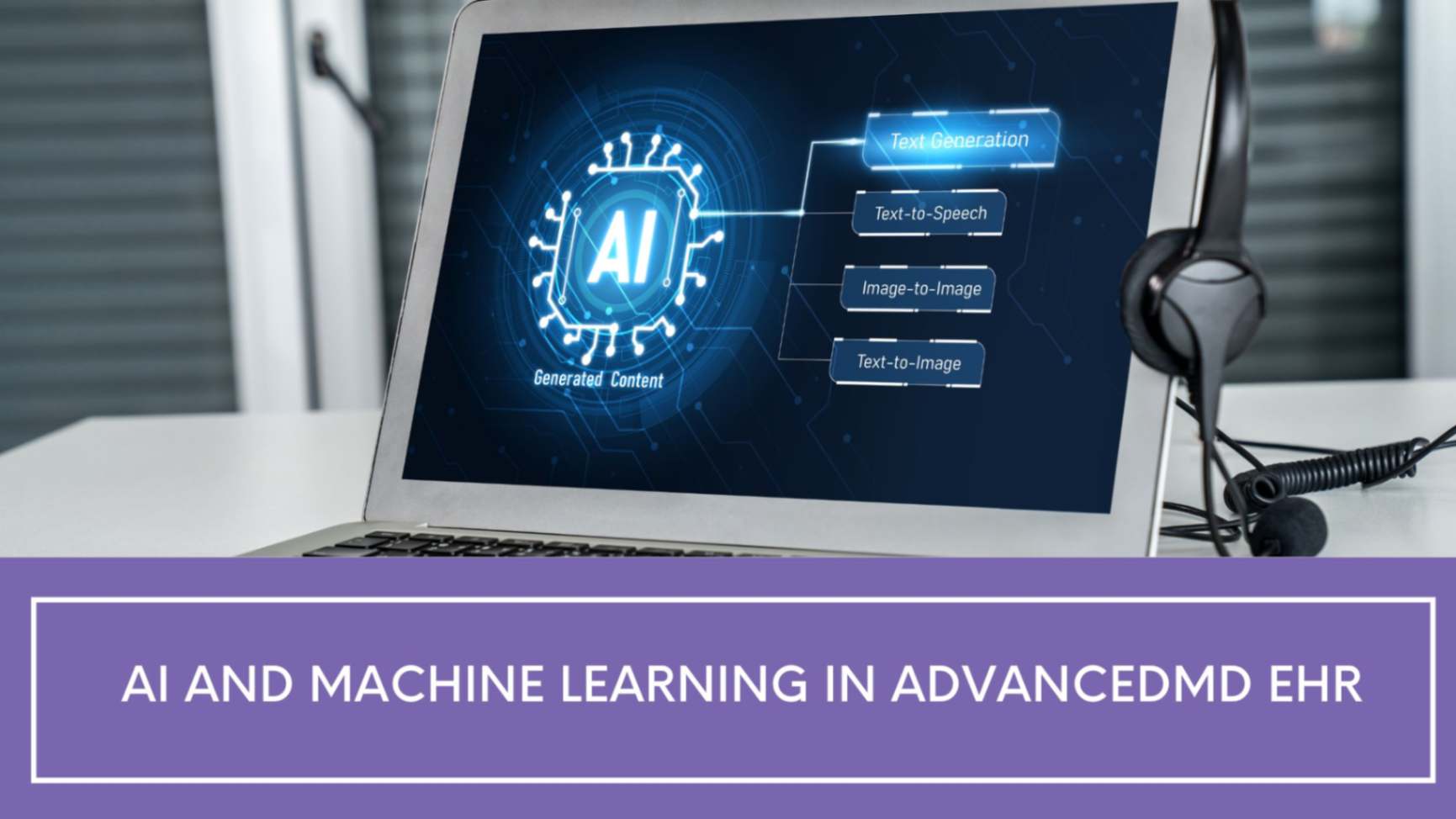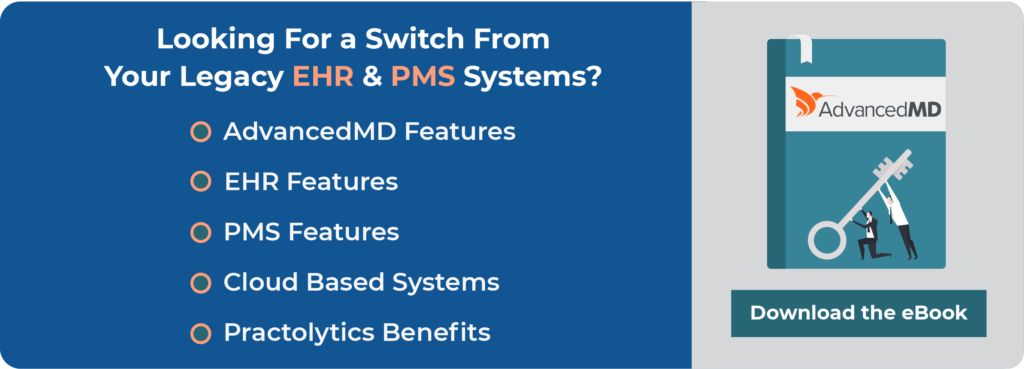AI and Machine Learning in AdvancedMD EHR
It is breaking through thanks to artificial intelligence and machine learning in healthcare, and clearly, AdvancedMD EHR certainly heads the pack.Indeed, AI and machine learning changed the course of healthcare since they enhance efficiency, accuracy, and decision-making capabilities. With the AdvancedMD EHR, the process streamlines with these technologies put into play for better patient care.
AI and Machine learning in Advancedmd EHR have provided healthcare providers with specific treatment plans, predictability of patient outcomes, and the potential to avoid errors. This has made healthcare data-driven and precise for providers and patients alike.
Table of Contents
What are AI and Machine Learning in Healthcare?
AI and Machine Learning are technologies that allow systems to learn from data without human intervention. Its use in healthcare includes analyzing the patient’s data, streamlining work on administrative processes, and predicting outcomes.
Predictive analytics and decision support tools powered by AI facilitate faster and more informed clinical decision-making, thus improving general patient care.
Relevance to EHR Systems
AdvancedMD EHR uses AI and ML in the EHR systems to manage large amounts of patient data. These technologies have improved data analysis that benefits the clinician, hence making healthcare providers make better decisions for the patient. AI enables real-time insights and predictive analysis with documentation to come out quickly.
Healthcare AI will be growing annually by 41% with the mainstreaming of predictive analytics and automation. Machine learning could reduce the error of diagnosis by as much as 40%. Therefore, patient outcomes are sure to improve. All this shows that the role of AI and ML in healthcare delivery is only growing with time.
Key AI and ML Features in AdvancedMD EHR
Documentation and Workflow Automation
AdvancedMD EHR offers artificial intelligence features that minimize effort in the documentation. Through speech-to-text capabilities and automation of often-repetitive activities, clinicians will spend more time on the provider side with patients and minimize administrative burdens to make the practice very efficient.
Predictive Analytics for Better Patient Outcomes
AdvancedMD employs AI to track patient data and predict possible future health risks. This helps clinicians identify trends and patterns, in turn helping them intervene promptly and provide more personalized and proactive care. It reduces the chances of complications and improves results for patients.
Real-Time Decision Support
Machine learning algorithms in AdvancedMD EHR provide real-time decision support, helping doctors make data-driven choices based on patient history, lab results, and other factors. This assists clinicians in offering faster and more accurate diagnoses and treatment plans.
Benefits of AI and ML in AdvancedMD EHR
- Improved Patient Care
AI-driven insights aid clinicians in providing more precise diagnoses and personal treatment plans. AI helps find risks to health by analyzing patients’ data and suggesting their best treatment. This increases better patient outcomes and enriched care.
- Increased Efficiency
AI and ML will reduce the administrative activities of advancedmd billing, scheduling, and coding. Automation reduces errors and hastens process speed. Healthcare providers have more time to attend to patients. Efficiency increases, and operating costs decrease.
- Data-Driven Decision Making
AdvancedMD EHR software enables better clinical decisions by analyzing both historical and real-time patient data through AI. The insights provided by AI reduce errors, support better health outcomes, and improve the overall quality of care. Data-driven decision-making also makes healthcare more efficient because clinicians have instant access to relevant patient information.
Trends and Future Developments in AI in Healthcare
The growth of telehealth has seen a rise in the use of artificial intelligence in telehealth. With AI, clinicians can now have virtual consultations, and it has opened up a door to provide care access to patients, especially those who are in underserved areas.
AI can analyze patient data in virtual consultations and help providers in decision-making, thus helping to increase the efficiency of telemedicine.
With Wearables and IoT integration, AI has empowered healthcare provision by ensuring more proactive and tailored approaches to healthcare experiences. All fitness tracking devices, smartwatches, and monitors send live data streams directly to healthcare workers who can review the collected patient data through AI processes for any early indication of certain conditions that would necessitate clinicians to act before getting out of hand.
More or less, continuous monitoring calls for a more personalized preventive healthcare experience.
AI Electronic Health Record Market Growth
As AI technology is incorporated more into EHR systems to advance the management of data, automation, and clinical decision-making support, the EHR market has much growth potential. AdvancedMD, the first in the EHR category, is also embracing AI-driven functionalities to offer improved service for healthcare providers. This, therefore, means that, as AI technology improves and evolves, it will continue to impact the future of health systems.
Overcoming the Challenges in AI and ML Integration
- Data Security and Privacy: With the increased uptake of AI in healthcare, concern has grown over patient data security and privacy. Most sensitive data is handled by these systems, and thus, safety mechanisms against breaches are to be developed. AdvancedMD will ensure that its platform maintains all HIPAA compliance, incorporating complex data encryption and management schemes to keep patient data protected.
- Challenges in Adoption by Small Practices: Small healthcare practices may have difficulties in adopting AI and ML technologies due to financial constraints, lack of resources, or resistance to change. However, AdvancedMD’s user-friendly design and training resources significantly ease the learning curve for smaller practices. Its scalability and affordability make it a viable option for small clinics looking to adopt AI without overwhelming their resources.
- Costs and ROI: The upfront investment in AI-based solutions is quite high, but the long-term ROI is considerable. AI-based systems, such as AdvancedMD, optimize operational efficiency, reduce error rates, and improve patient care. With time, these systems help practices save on administrative work, minimize the risk of medical errors, and deliver better care, leading to greater patient satisfaction and financial success.
Final Words
It’s rapid, totally transforming the healthcare landscape: efficiency, fewer errors, and more personalized. AdvancedMD EHR is here to change this, leveraging AI to standardize and simplify clinical workflows and enhance patient care.
It’s time that healthcare providers include AI-powered AdvancedMD EHR into their operations to compete better, enhance their patient’s care outcomes, and streamline their operations. All this will be achieved when this next-generation technology is incorporated in 2025 to enrich both the quality of care and patient experience.
ALSO READ – How Partnering With a Platinum AdvancedMD Provider Can Reduce Your Clinic’s Operational Costs?
Talk to Medical Billing Expert Today — Get a Free Demo Now!






